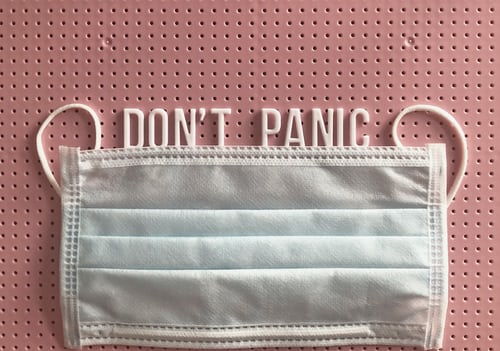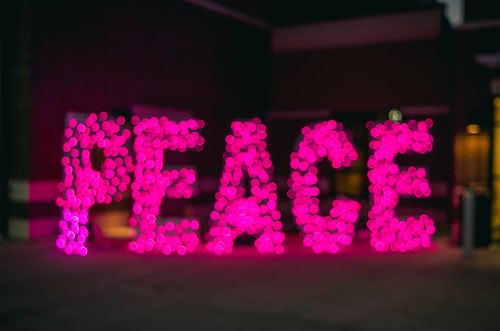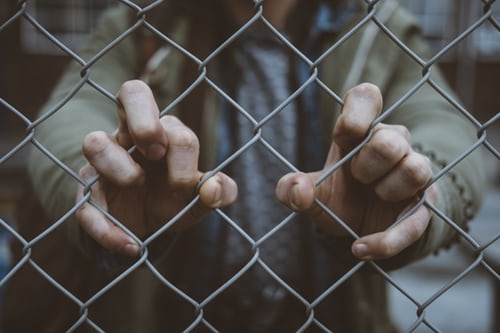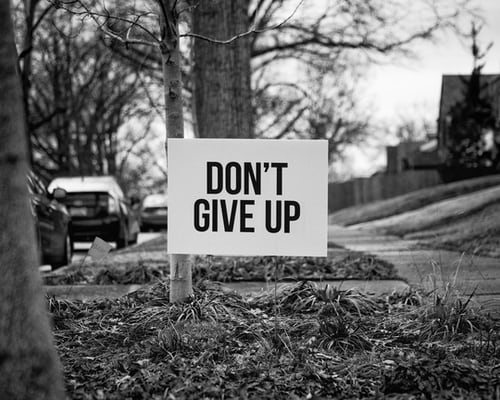What’s tailgating on your COVID-19 fear? Fear of infection? Fear of the future and unknown? Fear of loss and business failure? Maybe it’s vaccine fear and the government making it mandatory.
Whatever fear you’re feeling, it may not actually be fear.
It may be grief.
Grief may be the real villain lurking behind your emotions and uncertainty. And it may be accompanied by classic grief symptoms of numbness, sadness, anger, and loneliness. Not just the natural loneliness that accompanies extended lockdowns and stay-at-home orders, but the loneliness that tells you no one in the world has ever experienced what you’re going through and doesn’t have a clue what you’re suffering.

Tune in to your emotions—
Why is it so important to recognize your feelings and mine deeply into your heart and soul to discover what’s causing them?
Because if you don’t, you risk doing yourself physical, emotional, psychological and spiritual harm.
Without recognition and proper healing completion, you can be left with lifelong emotional and physical side effects.
The side effects of trauma.
Have you ever considered that what you’ve been experiencing for the last several months is trauma?
It is.
And most of us have experienced it to a certain degree.

Digging deeper into grief—
There’s no way around it. Grief is uncomfortable, even physically painful.
And it encompasses three elements in your life: emotions, spirituality, and intellect, in that order.
First, you’re drenched with emotions, some of which may come and go.
Then your spirit is affected. The part of you that holds your emotions and character. The deepest part of you feels the grief. The pain you feel in the pit of your gut and heart.
And finally your intellect comes around to recognition and dealing with all of it. Confronting the reality of it and figuring out how to adjust.
In the beginning, because it craves a nice familiar balance, the brain will naturally rebel. It feels the discord and fights against it. The more you rehearse something new and make it “normal” the more normal and familiar it becomes to the brain.

What grief can look like in a life-changing pandemic—
According to David Kessler, co-author with Elisabeth Kubler-Ross on the book: On Grief and Grieving: Finding the Meaning of Grief through the Five Stages of Loss, and author of the new book Finding Meaning: The Sixth Stage of Grief, it’s important to acknowledge your grief so you can manage it.
He also believes you can find meaning in it.
Let’s look at what’s been happening in most states around the country during this coronavirus crisis and how it’s affected you.
You’re likely feeling a number of different griefs.
The world around you has changed, maybe dramatically. There are things you feel you’ve lost.
Even though you know this restricted living is temporarily, it probably doesn’t feel like it. You wonder how long it’s going to go on. Worse yet, what if it never stops?
You know things will change—maybe like having to mask up on every airplane flight from now on and having to submit to temperature checks before being allowed to enter a terminal—but at this point you really don’t know all the changes, or how they’ll affect you.
Then there’s that loss of “normal,” and the economic toll—to you, your city, state and country—and the loss of close contact, the connection you enjoyed with others at your weekly girlfriends’ night out or worship service, where you hugged and chatted and sang—loudly.
You might be feeling a loss of safety—what if the guy that accidentally bumped into you at the grocery store breathed COVID-19 viruses on you, after he coughed? You run home and anxiously hunker down through 14 days of self-quarantine. Every day you wake up making an internal assessment of how you feel—feverish, chills, sore throat, body aches, cough, breathing.
And that loss of safety seems to be universal, or collective—people staying six feet away from others and looking suspiciously at anyone who missteps that distance. Or maybe spitting on someone who does, as one shopper did to another in a store recently. Nice. That makes everyone feel safer, doesn’t it?
As Mr. Kessler pointed out for a recent Harvard Business Review article , the stages of grief he and Ms. Kubler-Ross arrived at aren’t linear and may not happen in order. And you may go through your grief process without experiencing all of them.
He also gives a great parallel construction of the grief stages to this pandemic:
- “There’s denial, which we say a lot of early on: This virus won’t affect us.
- There’s anger: You’re making me stay home and taking away my activities.
- There’s bargaining: Okay, if I social distance for two weeks, everything will be better, right?
- There’s sadness: I don’t know when this will end.
- And finally there’s acceptance. This is happening; I have to figure out how to proceed.”
When you arrive at the acceptance stage, you can take steps to manage your response and feel as though you have more control than you thought you did over the situation. Well, at least over your life.
This, Kessler says, is where your power lies. This is where you can gain some control.
But there is another grief you need to be on the lookout for. A grief that can blow this situation out of proportion for your brain and emotions.
It’s called anticipatory grief.

What is anticipatory grief?
Several of my friends have experienced what we call anticipatory grief. It’s really anxiety, an unhealthy state of grief where you imagine the most horrible things that could happen. It’s where we see the worst-case scenarios and allow those scenarios to overwhelm our minds and bodies.
Kessler believes anticipatory grief is when our minds are being protective, and he gives some advice on how to manage that kind of grief.
“Our goal is not to ignore those images or try to make them go away — your mind won’t let you do that and it can be painful to try [to] force it. The goal is to find balance in the things you’re thinking. If you feel the worst image taking shape, make yourself think of the best image. We all get a little sick and the world continues. Not everyone I love dies. Maybe no one does because we’re all taking the right steps. Neither scenario should be ignored but neither should dominate, either.”
So it’s not a matter of trying to ignore these worst-case scenario thoughts, but to ask your brain some questions about what the reality is and the odds that those horrible things will really come to pass.
Bring yourself from the future back into the reality of the present.
Because that’s what you have control over.
As we’ve talked about in the last several posts, note your emotions, don’t get carried away in them. Note why you think you’re feeling them. Breathe and meditate. Use your senses to re-stabilize yourself—your surroundings, your present reality. Lean into what you do know.
Take control over what you can control. What others do or don’t do is out of your control. Don’t expend precious energy on thinking about it.
And practice compassion, on yourself and others. Frustrations are long, and tempers are short. People can overreact. Life is hard. We’re depleted of energy. Now is a time for all of us to extend great compassion and mercy toward one another.
And while we’re recognizing and honoring our emotions and tuning into our grief, we need to remember there are myths about grief we want to be aware of, and avoid getting caught up in.

Grief Myths—
As we talked about last week, from an early age we learn myths about grief. We learn those myths by watching others mishandle their grief, or we are taught those myths by parents, family members, friends and spiritual counselors who also learned them while growing up and believe they’re the right way to respond.
But these myths can stunt grief healing and grief completion.
Last week we looked at the three myths: Don’t Feel Bad, Replace the Loss, and Grieve Alone.
Today we’ll look at Be Strong and Keep Busy. In two weeks, we’ll cover the most well known myth:
Time Heals All Wounds.
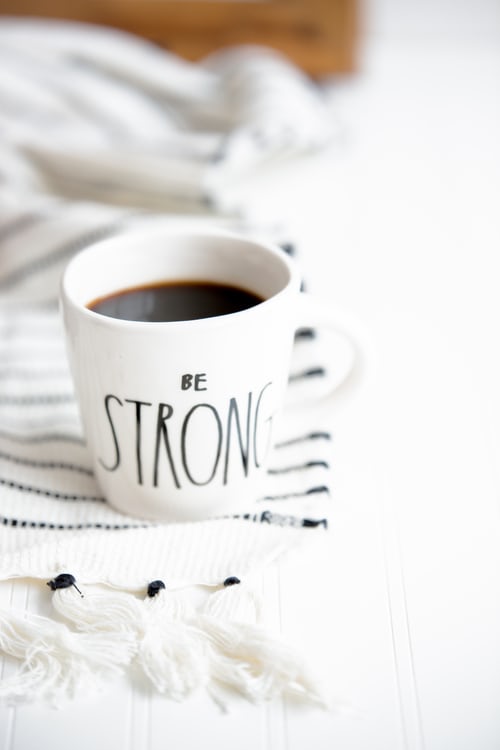
Be Strong Myth (#4)—
Ever heard anyone say, “You have to be strong for her”? It’s especially true if there’s a death in the family, or a grave illness.
Or maybe you’ve heard someone say it to a child when a parent dies: “You have to be strong for your mom.”
When we say things like that, or try to act strong when we’re not feeling it, we teach others that it’s best to tough something out rather than be realistic and honoring of our emotions and reality.
And we teach children habits that will hinder them in life.
When we encourage children to become the family caretaker, they feel as though they need to be the responsible “strong” one, and save everyone else in the family.
Overnight, they try to transform themselves from children into adults.
The experts at the Grief Recovery Institute claim this is probably the most damaging myth, and behavior, of all.
“In all our years of working with grieving people, one of the most common and difficult-to-overcome problems is the child who was cast in or adopted the role of taking care of everyone else. It is one of the most heart-wrenching examples of loss-of-childhood experiences. While we are able to help people get their hearts back, we cannot give them their childhoods back.”
How many of you feel as though you lost your childhood because you felt you had to be strong for the family, because no one else in the clan was behaving like an adult, so you had to?
I know I felt as though much of my childhood was robbed because of these underlying reasons.
I was taught to be tough, to be strong, to never display emotion. And because of my parents’ relationship with one another, I constantly felt like the intermediary, the fixer. For so many years (decades) I was angry, and I didn’t know why. A couple of years ago the light bulb in my brain went on, and I knew why.
I’d been forced to grow up before my time.
So what does real strength look like?
The Grief Recovery Institute explains:
“Real strength looks like this:
The natural demonstration of emotions.
Saying and doing what is emotionally accurate.”
What kinds of results does having and demonstrating real strength give you?
“[It] teaches…how to communicate feelings, not to bury them.
[It] sustains energy for other tasks.”
Proper expressions of emotions free up energy to deal with life.
When you cling to and bury feelings and don’t express them properly, they get improperly expressed through explosive behavior or implosive destructive actions.

Myth # 5: Keep Busy
Have you ever asked anyone recovering from the death of a loved one how they’re doing and receive the response: “I’m keeping busy”?
You might nod your heading knowingly and say, “I suppose that’s a good thing.”
But is it?
Keeping busy can be emotionally and physically exhausting.
After my daughter’s death, I either couldn’t stay busy enough or sleep enough. Either way I didn’t have to face my pain, think about my sorrow, or address the future.
I thought I was doing pretty well with my grief, being and doing constructive things.
I wasn’t.
Instead, I was avoiding the unfinished emotions attached to her physical death and the death of my hopes and dreams.
I distracted myself from pain and buried my emotions deep within my soul.
My husband did the same thing, immediately returning to work and distracting himself in it.
But grief emotions are powerful forces that don’t retreat or disappear quietly or without a fight.
When I lay down at night, the memories, emotions and physical pain swamped me like a tidal wave. And when they did, I put myself to sleep with the post-op painkillers my doctor prescribed. Until I ran out and he wouldn’t prescribe anymore of them.
Ever hear anyone talk about an emotional event they had that occurred twenty, thirty, forty or more years ago, and it sounds as though it happened yesterday?
Those people are the ones that haven’t really recovered from the event. They’re still reliving it.
As I’ve counseled before, please don’t rush yourself back into “normal” life after a traumatic event—like a death. And don’t let others try to rush you back there. There’s no “back there” to return to. You’re facing a new reality. You’re mind and body reel from it and reject it.
That numb feeling is normal. And it’s good for the overall recovery you need to go through. It protects us from dying of broken hearts, which some people do following the death of a spouse. Our brains, hearts, spirits and bodies need to adjust. And they need time to do that.
And each loss is unique to the individual. What’s helpful for one person may not be for another. And as much as time is a consideration, there is no recovery timeline a grieving person needs to be put on.
Above all, make sure a grieving person is allowed to share what they’re feeling. They need to be heard, and we need to listen.
If you or others are not heard in grief, then you risk burying emotions and developing behavior problems to combat the energy those emotions need to express and displace.
Then it winds up resembling a behavior problem rather than the grief problem it really is.
At this point a grieving person doesn’t need intellectual answers (those will come later, and they’ll figure them out), they need to heal their broken heart.
And that requires a lot of things.
Time isn’t necessarily one of them.
We’ll cover the time myth two weeks from now, on June 15.
Next week I’ll be providing a special COVID-break post.
I think we all need it.

Invitation:
- Continue to keep an emotions journal, noting what emotions you’re feeling and what triggers them. Again, don’t judge them. Just note them.
- How are you doing with COVID grief right now? At what grief “stage” would you say you’re functioning at—denial, anger, bargaining, sadness, acceptance? Or are you moving between them?
- What do you need to do to move through the process and come to terms with your losses and life changes? What are you doing to keep yourself physically healthy in the process?
- Have you experienced anticipatory grief, or are you in the middle of it, letting it cause you anxiety and paralyzing fear? How can you balance that kind of grief with reality and recognizing the control you do have over your life?
- What grief myths have you learned that have stifled your healing? What myths do you need to let go of in order to complete your grief healing process?
Until next week, journal your emotions, identify any anticipatory grief you’re experiencing, control what you can control (and rejoice over it!), and allow yourself to heal—without needing to be strong or keeping busy.
Blessings,
Andrea
Andrea Arthur Owan, M.S., A.T., R., is a fitness pro, chaplain, and award-winning inspirational writer. She works and writes to help people recover from trauma, grief and loss and to live their best lives — physically, emotionally, and spiritually.
